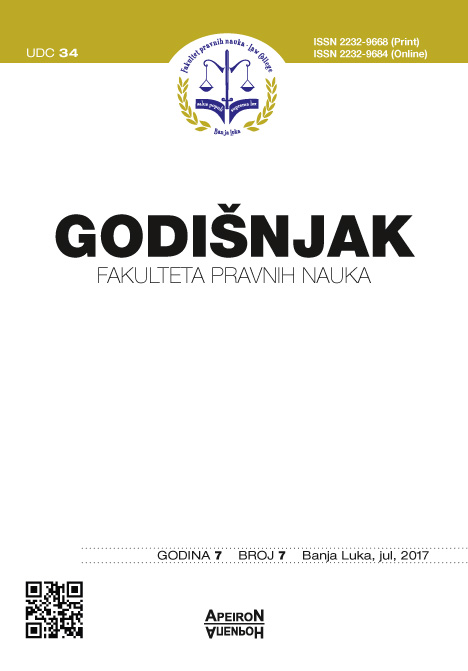Constitutional Right to Privacy, Freedom of Movement and Residence by Use of Biometric Data // Ustavno pravo na privatnost, slobodu kretanja i prebivalište korišćenjem biometrijskih podataka
DOI:
https://doi.org/10.7251/GFP1707128KAbstract
The Constitution of Bosnia and Herzegovina, Article 2 defines human rights and fundamental freedoms that are guaranteed in the territory of Bosnia and Herzegovina, and in paragraph 3 of this Article is enumerated a catalog of guaranteed human rights and freedoms. The right to liberty, security, privacy and family life and the right to freedom of movement and residence are consumed in an environment that is regulated by a number of laws and regulations in the legislation of Bosnia and Herzegovina. Fundamental human rights and freedoms cannot of absolute and may be limited realization of the right to a safe environment. Constitution of Bosnia and Herzegovina regulates that will establish a central register of all passports, which implies the establishment of the register persons who are citizens of Bosnia and Herzegovina, and for issuing passports. Freedom of movement is therefore limited by the obligation to persons registered and issued them passports. In the process of issuing passports citizen submits biometric data, in accordance with international standards. This shall be done for the purpose of regulating the right to freedom of movement with the guarantee of the right to a safe environment. Passports must be made in accordance with international recommendations and standards defined by the UN specialized agency for air traffic ICAO. The passports are entered biometric and other data of the passport holder in such a way that they must be machine-readable and electronic readable. According to ICAO standards are created and readers at border crossings to ensure an efficient and quick readability of passports. Each state must provide mechanisms that guarantee the identity of each holder of the passport. Every single issued passport in every country is the guarantor of international security, and each piece of data, including biometric must be kept in a way that guarantees the right to privacy. This paper presents an overview of the optimal relationship that is necessary to establish a basic human rights, and limitations of these rights in the allocation of a small security using biometric data and are presented with safeguards against abuse of biometric data.Downloads
Published
2017-07-27
Issue
Section
Чланци
